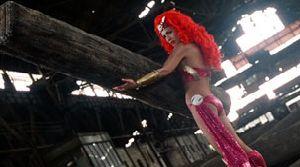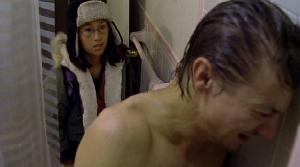 Super Noypi
Super Noypi (Quark Henares, 2006)
I thought I'd never see the day. I was standing outside the theater and noticed that showing in the theater across was
Wag Kang Lilingon (Don't Look Back, 2006) . It's a rare occasion to see two Quark Henares films being screened at once (it actually gave me a bit of hope for Philippine mainstream cinema since a maverick like Henares is actually being given projects; flashback to a few years ago when
Keka (2003) was the film that passed by public consciousness without creating a stir, I thought Henares isn't being given the attention he deserves). But of course,
Wag Kang Lilingon is a horror film and Filipinos are ready to munch up anything that's going to scare them artificially (also, the film is only one half Henares', the other half is by ---sigh--- Jerry Sineneng), and the one I'm seeing isn't technically being shown yet (it's a red carpet premiere --- I had to embarrassedly walk by hundred of screaming fans eagerly awaiting (and I seriously meant waiting since the film was supposed to start at 7pm, but the stars arrived at 9pm) their idols).
I had good seats; safe and away from the rabid starstruck crowd. The stars passed by me and my friends; wearing their costumes (how I pity them having to wear polyester outfits for the screening). Henares passed by. I thought he looked thinner (probably from the stress from making this film with all the studio bickering and the deadlines). After screening the trailers for the other three Regal Entertainment films that are showing for the Metro Manila Film Festival,
Super Noypi finally screened.
Let me get it out now:
Super Noypi is one messy film. It looked incomplete, and the special effects were not as polished as I wish they'd be. It started out promisingly. I thought the best thing about the film is that it is conscious of details. Futuristic Manila looks good: The skyline looked pretty; even prettier was the idea of the commuter's tricycle, which after decades of non-modification has finally morphed into a flying contraption. Lia (Jennlyn Mercado) alights from the tricycle, donning a hooded robe, and gets a contraption from a beggar in the street corner. I thought the way Henares envisioned the future as stereotypically futuristic (flying cars, high rise buildings, bright lights), and still managing to make the actual streets dim with signs of disgruntled citizenry is a feat. Pro-government propaganda are projected in the vandalized walls; fascist type police roam the dimly-lit alleyways (the area is supposed to be Luneta, but the futuristic dictatorial government probably thought badly of the pacifist National Hero and just let the park deteriorate, making it a viable hole for rebels) and start attacking Lia.
I hoped high for the action scenes; Henares after all had Phillip Ko (a Hong Kong director who managed to fall in love with the Philippines to start eking out a career here --- under his belt are several Filipino-Hong Kong co-productions) to choreograph the action scenes. The action scenes however were awful; a lot of editing work was done to remove the inability of the actors and actresses (and the technical staff) to adequately stage fight sequences. If the editing were at least consistent, the action scenes wouldn't suffer that much. The wire works (or low budget harness and wires method of filmmaking) was quite terrible; even the stunts were quite unimaginative and the level of risk which usually accompanies such stunts is kept to a boring minimum (watch
Ong Bak (Prachya Pinkaew, 2003) and you actually feel the pain and the effort of the stuntspeople, including the main actor). To make matters worse, the film relied too much on the terrible special effects that one can be quite intuitive (just carefully observe the changes in film grade and quality) when and where the film would use CGI cut-and-paste technology to supposedly improve upon the action sequences. There are no genuine climaxes in Henares' filmmaking; it's all kick, stunts, punch, superpowers with little or no emotional heights or burdens. Music's at fault here: I understand Henares' reliance for pre-existing music for his films, or keeping the music at a substantial melodic low, but in certain films like
Super Noypi, there's a need for pumping out whatever you can pump out from a sequence, and that is what musical scoring is made for (learn from Sergio Leone, or heck, even George Lucas who manages to understand the technical and musical needs of their respective genres).
The film is a technical train wreck. The tight budget shows; the blue paint that covers the body of Ynigo (John Pratts) seems to melt away with sweat. A bit of meticulousness could've made wonders. However, the deadline that has to be met in time for the lucrative film festival seemed to prevent Henares from achieving whatever aesthetic principle he had in mind with the film. Production design was almost non-existent. The sets are laughably empty; white paint is obviously used in what is supposed to be futuristic or at least clinically hygienic (the Noypi laboratory is drably empty).
But again, I could've forgiven the technicals, or even the awful action filmmaking if the story made sense --- but as you've guessed, it didn't. The plot basically follows Lia as she time travels back to the past (or more accurately to the present) and urges a group of teenagers to suddenly cognize that they have powers. These powers, which they inherited from their parents who are anonymously part of a superhero team called the Noypi, are strongest when they're in stressful situations. When evil Diego (Monsour del Rosario, who is a huge waste of talent --- he's one of the few real action stars in the country. He is actually proficient in martial arts.) kidnaps the teenagers' parents out of vengeance. The teenagers are forced to face their new-found powers and identities to save their families, and the world. Their powers aren't even that creatively conceived. Lorenzo (Mark Herras) has the power of telekinesis; Ynigo (John Pratts) turns into a blue-skinned strongman; Michie (Sandara Park) has the ability to use the sun-moon staff, which throws out fireballs and icebeams; Euen (Polo Ravales) can cast spells out of a spellbook, little boy Tonton (Andrew Muhlach) can turn into a cannonball, I think, and Annys (Katrina Halili) has invisibility powers. Think Filipinized X-men with the exception that their powers aren't from genetic mutation (far fetched but is at least consistent) but from a contrived mixture of Filipino folklore, sci-fi mumbo jumbo, and colonial mentality deviations. I won't even start with the glaring narrative inconsistencies, since there's too many of them and I'm starting to run out of negative adjectives.
Despite the technical and narrative inadequacy of the film, it still feels like an authentic Quark Henares film (even more so than his episode in
Wag Kang Lilingon). It's a superhero flick wherein the superheroes have genuine Generation X and Y angst. Before they became heroes, they problemize over parental approval, girlfriend issues, class bullyism, sibling indifference and typical mundane dilemmas. They are aware of the latest music fads, and consumer gadgets. In one scene, the characters start testing out their individual powers when Annys comes barging into the room and start problemizing over her monthly period. It's all very interesting and Henares seems most comfortable dealing with that kind of filmmaking rather than continuing with the storyline. However, it's quite notable that these teenagers' angst remain to be the angst of the privileged: annulment, petty lovers' quarrels, allowances, menstruation. There is no life-or-death angle, no poverty, no immense struggle for survival, that grounds the film to subtle importance. It's all very cute to have these telekinetic, spell-casting, and destructive superheroes go about their world-saving ways while bickering over the nothingness of their teenage lives, but the same was done in Bryan Singer's
X-Men and the latter, together with its inter-character rapport (which Henares' film sorely lacks), managed to say something genuinely important.
I return to my initial observation: Two Henares films showing at once. In the past, it's probably a Filipino cinephile's wet dream. However, if the quality of the Henares film is the same as
Super Noypi, I'd rather have Henares make one film every five years, as long as it's assured that it's a film he wants to do. Right now, Henares is turning out to be a mercenary for a cause he has no faith in, a filmmaker for a studio he can never ever agree with; and it shows, it stinks.
























wm.jpg)


























.png)



